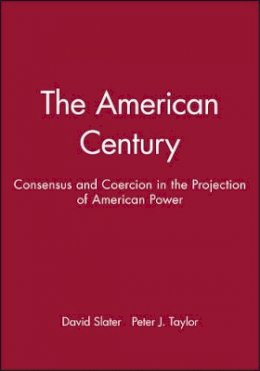
Stock image for illustration purposes only - book cover, edition or condition may vary.
The American Century: Consensus and Coercion in the Projection of American Power
Slater
€ 186.35
FREE Delivery in Ireland
Description for The American Century: Consensus and Coercion in the Projection of American Power
Hardback. Presents studies of Americanization and American imperialism to assess how far the twentieth century can be seen as the 'American Century'. This title explores the 'geographic dialogues' that arise as the result of the projection of American power and culture in the world. Editor(s): Slater, David; Taylor, Peter J. Num Pages: 376 pages, 0. BIC Classification: 1KBB; 3JJ; GTB; HBJK; HBLW; JFC; JH. Category: (P) Professional & Vocational; (UP) Postgraduate, Research & Scholarly; (UU) Undergraduate. Dimension: 253 x 174 x 30. Weight in Grams: 868.
This book brings together studies of Americanization and American imperialism to assess how far the twentieth century can be seen as the "American Century".
This book brings together studies of Americanization and American imperialism to assess how far the twentieth century can be seen as the "American Century".
Product Details
Format
Hardback
Publication date
1999
Publisher
John Wiley and Sons Ltd United Kingdom
Number of pages
376
Condition
New
Number of Pages
378
Place of Publication
Hoboken, United Kingdom
ISBN
9780631212218
SKU
V9780631212218
Shipping Time
Usually ships in 7 to 11 working days
Ref
99-50
About Slater
David Slater is Professor of Social and Political Geography at Loughborough University, and Joint Editor of Political Geography. He is author of Territory and State Power in Latin America (1989) and editor of Social Movements and Political Change in Latin America (1994). Peter Taylor is Professor of Geography and Associate Dean for Research in the Faculty of Social Science and Humanities at Loughborough University. He was the editor of Political Geography (1982-1998) and an editor of Review of International Political Economy (1992-1997). His previous books include The Way the Modern World Works: World Hegemony to World Impasse (1996) and Modernities: A Geohistorical Perspective (Polity, 1999).
Reviews for The American Century: Consensus and Coercion in the Projection of American Power
"[A] lively and insightful collection of essays ... by and large readable and succinct, suggesting a strong editorial hand. They are accessible to non-specialists and will prove useful in the classroom." Progress in Human Geography
